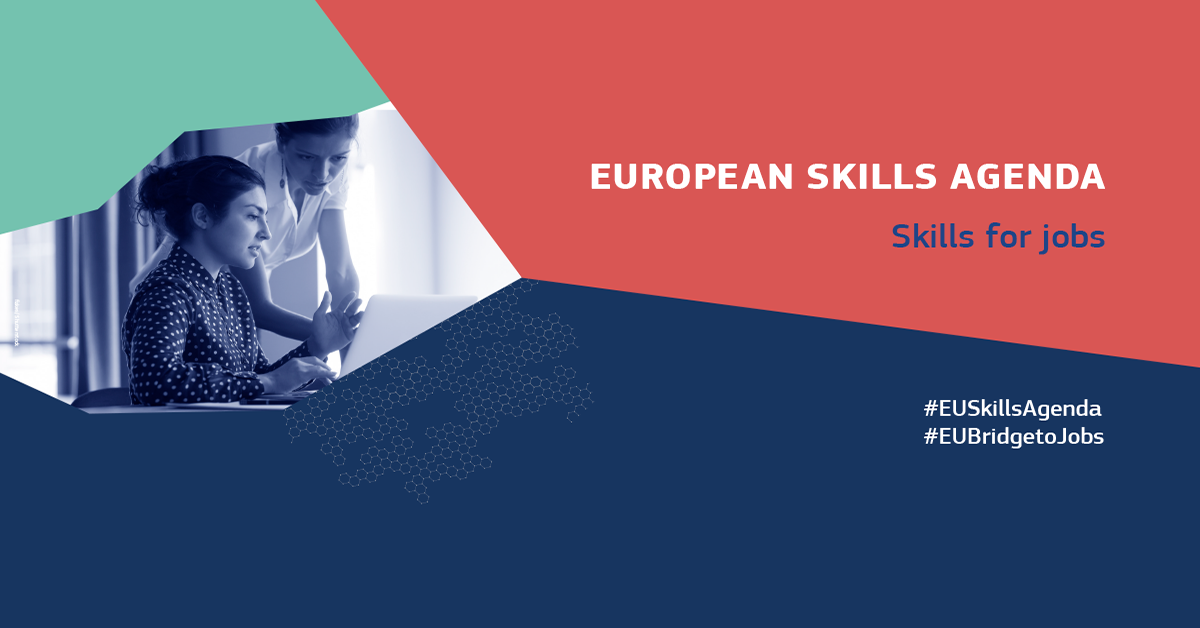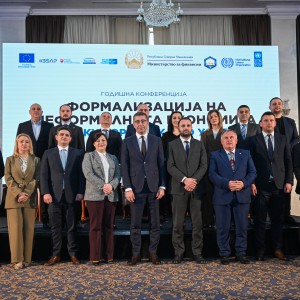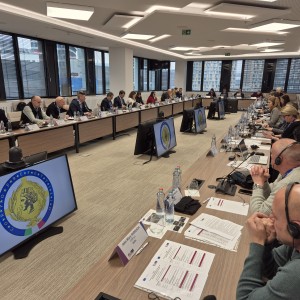News
01 July 2021 |News
European Skills Agenda & Youth Employment Support: one year on

European Skills Agenda (Photo: ec.europa.eu/social/)
Already one year has passed since the European Skills Agenda saw the light of day. Time to take stock and look ahead.
Exactly a year ago the European Commission presented the European Skills Agenda for sustainable competitiveness, social fairness and resilience and set ambitious, quantitative objectives for upskilling and reskilling.
What has happened?
Nine of the 12 flagship initiatives have been launched and the Commission will present proposals on the remaining three before the end of this year.
Behind each of these flagship initiatives are activities to open up education and training opportunities for everyone, make qualifications and certificates more transparent and accepted across borders, and shed light into what are the skills needed for the labour market of today and tomorrow.
What does this mean in practice?
Pact for Skills
Through the Pact for Skills, the European Commission is bringing together companies, workers, national, regional and local authorities, social partners, cross-industry and sectoral organisations, education and training providers, chambers of commerce and employment services to create a culture of lifelong learning at work.
Nearly 400 organisations have signed up to the Pact already, committing to a charter with key principles on building quality and inclusive skills initiatives.
Large-scale partnerships are emerging: the ball is rolling in 14 ‘industrial ecosystems’. High level round tables with movers and shakers in these ecosystems, are being followed by commitments on what they will do to help up- and reskill their employees, and people who work – or want to work in their sector.
Europass
Over two million people are using Europass to showcase their skills and connect with jobs and learning opportunities across Europe.
Modernised in July 2020, the new Europass includes an online profile, which allows people to record all their achievements in learning, working, volunteering or any other experience.
Europass also helps people understand the value of their skills – thanks to the European Skills, Competences, Qualifications and Occupations classification (ESCO) – and interests as well as the next steps they want to take in their career.
It offers tailored job suggestions in cooperation with EURES, as well as a wide range of courses and useful information on working and learning in Europe.
Skills Intelligence
Do you want to know what are the skills most sought after now in your region? Or what are the occupations on the up? These are just some of the things that we are shining a light on.
The EU agency Cedefop is using cutting-edge technology to analyse thousands of job portals and millions of job adverts across Europe in all European languages. In ‘SkillsOVATE’ you can find out where the opportunities for your chosen profession are greatest, or what the most requested skills are.
This work, together with more traditional skills intelligence sources, like forecasts, company surveys or information on bottleneck vacancies, helps us to understand how the labour market is evolving and provide more granular evidence to guide people’s choices.
Vocational education and training (VET)
A new Council Recommendation together with the Osnabruck declaration have set a strategic vision for EU cooperation on VET and defined a set of concrete actions to be carried out at EU and member state levels.
The initiative on Centres of Vocational Excellence (CoVE) is now in full swing – supported by Erasmus+ funding. CoVEs bring together a wide range of local stakeholders, enabling VET institutions to rapidly adapt skills provision to evolving economic and social needs. They operate in a given local context, being the linchpin of skills ecosystems for innovation, regional development, and social inclusion, while working with CoVEs in other countries through international collaborative networks.
The renewed European Alliance for Apprenticeships, has grown further, to reach over 1 million apprenticeship placements and other learning opportunities. The Alliance, embedded in the Pact for Skills, places a new focus on digital and green apprenticeships, while fostering national apprenticeship coalitions, incentivizing support to SMEs, and mobilising local and regional authorities for apprenticeships.
The high ambition of VET policy priorities have been matched with significant EU financial resources under the new MFF. The Erasmus+ programme has assigned more than €4,3 billion to support actions in the area of VET in the period 2021-2027, with an additional €400 million to support more than 100 networks of Centres of Vocational Excellence over the period 2021-2027.
Almost 2 million VET learners, apprentices and staff will be given the opportunity to have a work-placement abroad in any country of the world.
Youth Employment Support (YES)
Very early in the COVID-19 pandemic it became evident that young people would be among those hardest hit by the containment measures, such as closures of schools and work places. In addition, it was important to support young people to build back better for the future.
Exactly one year ago, the Commission proposed the Youth Employment Support (YES) to support young people, however, it was not limited to crisis support but also had as an objective to help young people in the long term.
Since then, a series of initiatives and activities announced in YES have been pursued both at the EU and the Member State level. For example:
- in Germany, short-time work schemes helped young people stay in their jobs and continue their apprenticeships
- in many Member States, such as Hungary, Cyprus and Romania, targeted hiring subsidies allowed recently graduated young people find a first job
- new posts were created in sectors that needed more workers, such as the health or social sectors in Belgium, or the sports sector in France, allowing young people to put their skills into practice
- financial support was made available for young Belgians who wanted to launch their own enterprise
- in Lithuania such support was offered for young entrepreneurs who had to change their economic activity
The YES package included a proposal for the reinforced Youth Guarantee, which came into force as a Council recommendation on 30 October 2020. Member States are currently implementing a variety of Youth Guarantee activities which aim at reducing unemployment and inactivity amongst young people by preparing them better for the labour market. For example:
- Belgium has decided to intensify outreach and guidance towards young people not in employment, education and training (NEETs)
- in Austria, low-threshold training offer has been expanded to help this particular target group
- many unemployed young people in Greece, Latvia and Portugal now benefit of short training courses that should offer them the digital skills they will need at the labour market
- partnerships have always been the foundation of Youth Guarantee activities, but the crisis situation has concretely demonstrated their importance, resulting in strengthened cooperation between different authorities for example in Austria, Sweden and the Netherlands
The crisis is not over yet and many young people continue to suffer from its impact. Continuing support measures is vital. The European Commission supports the Member States with funding through the NextGenerationEU and the European Social Fund+ and by offering platforms to exchange ideas and experience. The state of implementation of the reinforced Youth Guarantee will be monitored in the Employment Committee Review in October 2021.
Read the full text HERE
Source: ec.europa.eu/social/





